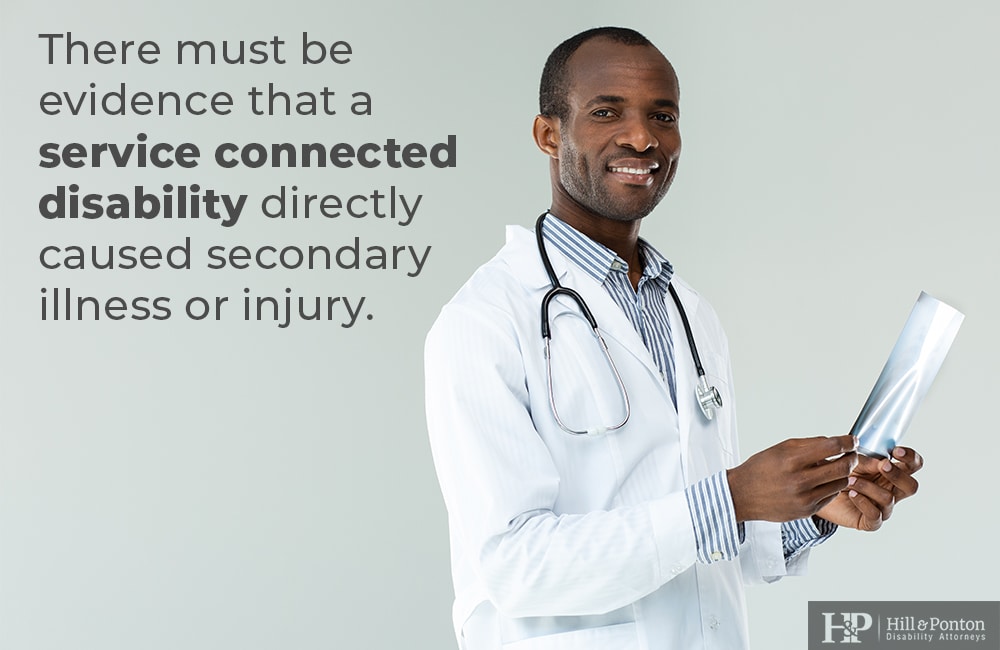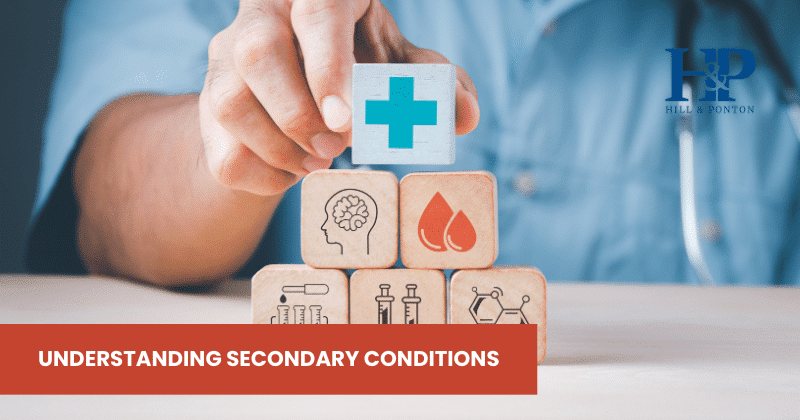Secondary disabilities may not be the first thing that comes to mind while filing your VA compensation claim, but they can be integral to the process.
A secondary disability is when a service-connected disability has caused or has aggravated a new or pre-existing condition, illness, or injury.
VA Disability compensation can often extend beyond an original military service-connected injury as long as there is sufficient medical evidence.
Filing a Claim for Service-Connected Conditions
There are two distinct categories of claims according to the Department of Veterans Affairs: secondary service connection and secondary service connection by aggravation.
What is VA Secondary Service Connection?
This means that a service-connected illness (such as PTSD for example) or injury caused another illness, mental health condition or injury. For example, diabetes is one of the most common service-connected illnesses.
If a veteran with diabetes develops complications from diabetes such as stroke, kidney failure, peripheral neuropathy, vascular disease, hypertension, migraines, other cardiovascular issues, etc., they could then claim those conditions as secondary to a service-connected disability.
There must be evidence that the service-connected disability directly caused the secondary illness, injury, or medical condition. So, you cannot claim that diabetes mellitus caused Parkinson’s Disease or a traumatic brain injury, but you can claim it caused blindness, high blood pressure, or loss of a limb if you have evidence showing the diagnosis and progression. Keep in mind that most primary health conditions you’ll find on VA.gov have common conditions and common secondary illnesses that are regularly associated with them.

Secondary Service by Aggravation
Secondary service by aggravation is a little different in that it is not something that was directly caused by the service-connected illness or injury but was aggravated by it enough that it is now an issue of its own.
An example of this would be that someone has flat feet diagnosed in service and is service-connected for that illness.
Now, several years later, they are diagnosed with rheumatoid arthritis in their back.
As time goes on, the veterans’ arthritis progresses to the point where they have to have surgery and possibly assistance walking such as with a cane or walker.
While rheumatoid arthritis is genetic, and therefore cannot be service-connected; it can be aggravated by the abnormal gait caused by the flat feet condition.
Also, something to note, while the initial service-connected disability may have a low rating, the aggravated secondary condition may get a much higher one.
In this case, the flat feet may have only been rated at 0-10% but the debilitating effects of rheumatoid arthritis in the back being aggravated may have now caused loss of independence and could possibly be rated up to 100% or warrant unemployability, aid, and attendance, or special adaptive home grants.
What VA Looks At for Common Secondary Conditions Service Connected
Progression is shown by first having a primary diagnosis that is service-connected.
This primary diagnosis should be backed by medical records and already acknowledged by the VA.
Second, you must show treatment for that primary diagnosis and either the onset of the new illness or injury or the aggravation of the existing one.
There must be a diagnosis of the new/aggravated illness or injury before you can file the claim.
For example, you can’t file for blindness secondary to diabetes just because you may go blind, only once you have already gone blind.
Having statements from your treating physicians showing how the existing illness/injury caused or aggravated the other will give you the best chance at a positive claim outcome.

Proving VA Service-Connection
The VA usually requires a nexus Letter when granting a secondary service connection, similar to a primary service connection.
Though the nexus letter will not need to prove the condition is from active duty service itself, it will need to prove the condition is caused or aggravated by the already service-connected disability.
These letters are most often needed from medical professionals to show the connection between the primary and secondary diagnosis.
You may still need this nexus letter even if the VA has conceded to the condition being caused/aggravated by your service-connected disability.
The VA has before recognized that sleep apnea can be aggravated by PTSD (Post-traumatic stress disorder), but a letter may still be required by a professional making the connection in order to receive VA disability benefits.
When To File Secondary VA Conditions
If you have knowledge that a disability may be from your service-connected disability, keep the following in mind for when you want to file for a secondary disability:
- You are showing symptoms of a disability
- Your doctor has mentioned you are more likely to develop a disability
- Others around you have noticed symptoms or prominent side effects (snoring while sleeping, for example)
Before you file for a secondary disability, you do not have to be diagnosed with this condition.
You will need to be able to show a formal diagnosis and medical treatment for this condition later in the claim for support.
For example, if you are having symptoms of sleep apnea or your doctor orders a sleep study, you may consider filing this claim.
If you feel you have a condition, seek treatment for this condition as soon as possible.
Having these records and statements from your physician(s) will be a great leg up in creating the nexus letter mentioned earlier.
Having this evidence prior to filing will give you the best chance of having your claim resolved as smoothly as possible.
Be sure to let your attorney or disability benefits representative know if you receive any new diagnoses from your doctor.
There may be benefits or secondary VA disability claims that you are not aware of which your representative can assist you with.

Not all Secondary Conditions will Receive a Rating
Oftentimes, because every person is different, someone will develop an illness that may be related to a service-connected disability, but the VA doesn’t award a secondary connection for it.
This could be the case in such issues as depression caused by diabetes or sleep apnea caused by a spinal condition.
Unless you have a nexus letter from your doctor that can convince the VA of the connection, it is rare that the VA awards secondary service connection for issues that are not normally associated with the service-connected issue.
Sometimes, medical personnel can find new and emerging studies and journal articles that can support the connections which will help a claim.
Also, be aware of whether you are claiming that the injury or illness was caused by or aggravated by the service connected disability.
If you have a genetic or hereditary issue you can not claim it was caused by the S/C issue, only aggravated.
Note that a simple mistake leads to a claim denial. Then the claim may remain in appeals for years until someone discovers the mistake.
Because the claim wasn’t filed correctly, the effective date is delayed. Then the veteran must file a new claim.
Be sure to review this with your representative or attorney when you are filing for secondary issues or a secondary claim.




